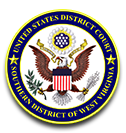- Documents.
In compliance with the policy of the Judicial Conference of the United States, and the E-Government Act of 2002 and its amendments, and in order to promote electronic access to case files while also protecting personal privacy and other legitimate interests, parties shall refrain from including, or shall partially redact where inclusion is necessary, the following personal data identifiers from all pleadings filed with the court, including exhibits thereto, whether filed, electronically or in paper, unless otherwise ordered by the court.
- Social Security Numbers. If an individual’s social security number must be included in a pleading, only the last four digits of that number should be used.
- Names of Minor Children. If the involvement of a minor child must be mentioned, only the initials of that child should be used.
- Dates of Birth. If an individual’s date of birth must be included in a pleading, only the year should be used.
- Financial Account Numbers. If financial account numbers are relevant, only the last four digits of these numbers should be used.
In Compliance with the E-Government Act of 2002, a party wishing to file a document containing the personal data identifiers listed above may file an unredacted document under seal or may file a reference list under seal. This document shall be retained by the court as part of the record. The court will require the party to file a redacted copy for the public file.
The responsibility for redacting these personal identifiers rests solely with counsel and the parties. The Clerk will not review each pleading for compliance with this rule.
- Transcripts of Hearings.
If information listed in Section (a) of this Rule is elicited during testimony or other court proceedings, it will become available to the public when the official transcript is filed at the courthouse unless, and until, it is redacted. The better practice is to avoid introducing this information into the record in the first place. If a restricted item is mentioned in court, any party or attorney may ask to have it stricken from the record or partially redacted to conform to the privacy policy, or the court may do so on its own motion.
Privacy Protection for Filings Made with the Court
